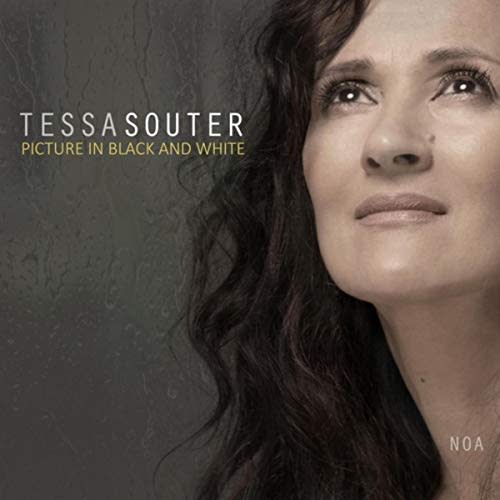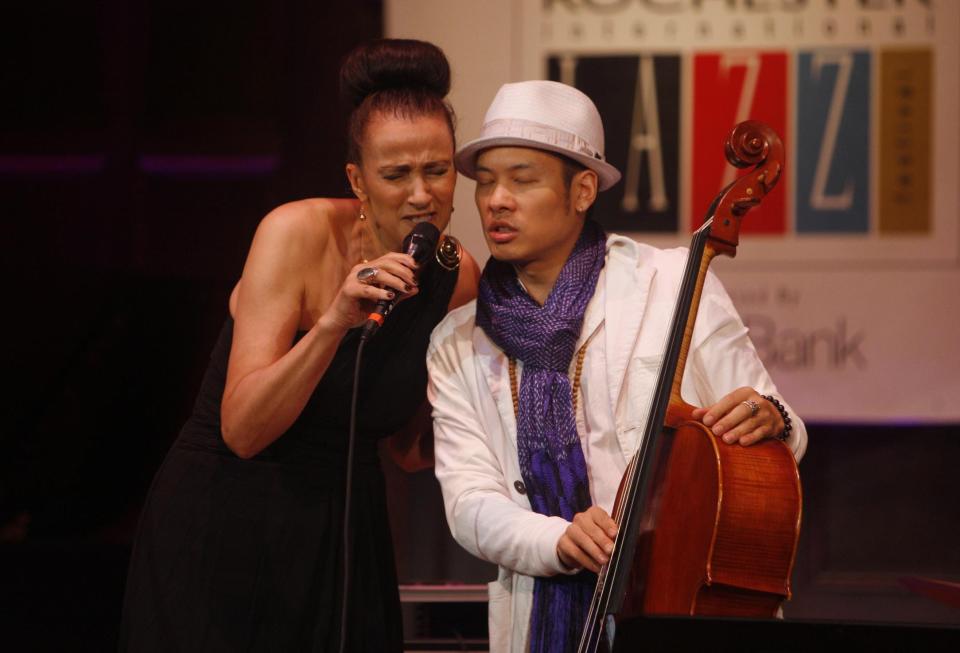Singing her truth: Jazz Festival favorite Tessa Souter explores race, identity through music
- Oops!Something went wrong.Please try again later.
When a small girl, Tessa Souter had few answers to why she was brown-skinned, a trait that separated her from all of her British friends and family, including her blonde-haired brother.
"I used to put lemons on my skin to try to make myself whiter because I wanted to blend in with my friends," Souter said.
It would be years before the jazz singer learned the truth, a story very different than what her mother had told her — that her father was a Spanish man who had died in a plane crash.
Instead, as Souter discovered, her father was a Black man from Trinidad and very much alive. Though always sensitive to issues of race and inequity, Souter now had a new lens about the plight of Black people, especially those in the United States, where she now lives and where the ugly legacy of slavery still reverberates.
Some people still see her as white, while others recognize that she has Black roots, Souter said in a telephone interview from her Manhattan apartment. Souter is returning this year to the CGI Rochester International Jazz Festival, where she has performed multiple times in the past. Her first visit was 15 years ago.
Souter is known for a sultriness with her vocals and a casual reworking of some pop classics and standards that she makes her own with altered delicate spacing with the lyrics. In whatever fashion she may reconfigure a song, there is one constant: "Everything I sing has to have some kind of meaning to me.
"I'm not just singing a song because it’s a beautiful song. There are a lot of beautiful songs out there. It has to mean something to me."
So it's no wonder that, for Souter, her very life and the mysteries she has unraveled wound their way into her music. Her 2018 album, "Picture in Black and White," is an eclectic assortment of songs, and in each — whether Broadway's "A Taste of Honey" or U2's "Where the Streets Have No Name" — Souter has found some connective tissue with her heritage.

Some songs, originally constructed by songwriters about loves found and lost, instead, take on new meaning when coupled with Souter's investigation of race and identity. The album ends with Brazilian singer Milton Nascimento's "Nothing Will Be As It Was," best known by the late jazz singer Sarah Vaughan.
“For me that song sums up the very essence of the Reconstruction and the end of slavery,” Souter said in an email follow-up to the telephone interview. “From my segue out of Terry Callier’s ‘Dancing Girl’ — 'somewhere between time and space, we shall be free’— to the opening lyric ‘Got my feet on the road just to see you’ (like even being able to do that is not taken for granted) to the immortal line ‘holding on to a teardrop of sun in the mouth of the night.'
"It’s so evocative.
Learning the truth about her father
Souter was 12 when her mother told her that her birth father was Spanish, and that he was the son of a flamenco dancer.
Souter accepted the story, which became a shield at school where she was being bullied and teased her about her skin color.
She once was spat upon by a skinhead in the street and often endured verbal taunts and physical abuse. Sometimes she fought back.
"I remember once grabbing a boy by the lapels and actually lifting him up the ground," she said. "At the time my mother told me about my father, (the bullying) was really excessive."
When she began to tell classmates that she was Spanish, much of the racism came to a halt.
Souter was 28 when she learned the truth about her father. Her mother had actually given Souter her father's true name, which was far more Irish than Spanish. Souter tracked him down, only to find out he was from Trinidad. He was living in London with his German wife and four children.
It took a year for them to finally meet. Souter was concerned how her adoptive father would feel.
"All the time it was a big secret from my other Dad," Souter said.
Finally, she and her birth father met in London and visited a teahouse. "He was this fabulous dark copper color. ... I just kept drinking him in with my eyes, kind of absorbing it all."
Then they went to a park, and, while walking there, he launched into song. Passers-by stopped, enchanted by the purity of his beautiful tenor.
"It was almost like it vibrated in my breast bone," Souter said. "When I hear something that's very true, that's where I feel it."
Over the years the two did build a relationship. He died in the late 1990s, having been stricken by Alzheimer's in his later years.
"My real introduction to my Trinidad side came from my relationship with my father's sister, who it turned out had been living in New York," Souter said.
A Rochester International Jazz Festival darling
Tessa Souter has become a regular at Rochester's jazz festival, playing multiple venues and sometimes appearing as part of the "Made in the U.K." series.
Whether Rochester or elsewhere, she has found that many in her audience find their personal resonance with her songs, even as she selects and crafts them as part of her own journey.
"My songs, they're kind of ambiguous," Souter said. "Maybe it's that the songs I choose or the songs I write are open to multiple interpretations."
Once, she recalled, a man came up to her after a show and said, "That's the first time I've cried since my son died." Another time, a woman said: "Thank you for your concert. You've made me want to go home and make love to my husband."
John Nugent, co-producer and artistic director of the jazz festival, said, "Tessa Souter has become a favorite of (festival) fans not only because of her beautiful voice and amazing artistry but because of her warmth as a person.
"She is a beautiful human being who relates to her audiences as well as any artist we’ve ever presented," he said.

Souter will have two performances during the opening night of the festival, Friday, June 17, at Glory House International, which previously was the Lutheran Church at 111 N. Chestnut St.
"What I really love about that festival is it's so beautifully curated; it's kind of brave curation," Souter said, likening the festival line-up to the work of an interior decorator who takes varying and distinct pieces and packages them into an artistic symmetry.
"Because they've been curated by one designer, they are coherent," she said. "They're all very different, but they're coherent.
"Another thing I love about the festival are the audiences. They're really amazing people. They are such jazz fans in Rochester. It's so beautiful to play for them. You really feel embraced."
There is another reason she keeps returning, Souter said.
"Because they keep inviting me back."
Contact Gary Craig at gcraig@gannett.com. Follow him on Twitter at gcraig1.
This article originally appeared on Rochester Democrat and Chronicle: Jazz singer Tessa Souter a Rochester International Jazz Festival performer

